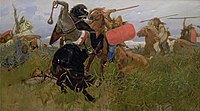
Back نياز Arabic Kniaz AST Knyaz AZ Кенәз BA Князь BE Князь BE-X-OLD Княз Bulgarian Knez BS Kniaz Catalan Kňaz Czech

 |
| Knyaz (sovereign) |
| Boyar / Szlachta (noble) |
| Druzhinnik (retainer) |
| Smerd (free tenant) |
| Kholop (slave) |
Knyaz, also knez, knjaz or kniaz (Old Church Slavonic: кънѧѕь, romanized: kŭnędzĭ), is a historical Slavic title, used both as a royal and noble title in different times. It is usually translated into English as "prince", "king", or "duke" depending on specific historical context and the potentially known Latin equivalents at the time, but the word was originally derived from the common Germanic *kuningaz (king).[1]
Feminine forms of the word may be divided into two groups:
- "Princess", be it princess consort (wife of a reigning prince), princess regnant (reigning princess suo jure), or princess regent (reigning on behalf of an underage prince, usually her son after her husband's death)
- Belarusian: kniahinia (княгіня)
- Bulgarian and Russian: knyaginya (княгиня)
- Slovene and Serbo-Croatian: kneginja (in Serbian Cyrillic: кнегиња)
- Ukrainian: knyahynya (княгиня)
- "Daughter of the prince"
- Belarusian: kniazioŭna (князёўна)
- Russian: knyazhna (княжна; the son of a knyaz is knyazhich (княжич in its old form).[2]
- Ukrainian: knyazivna (князівна).
The title is pronounced and written similarly in different European languages. In Serbo-Croatian and some West Slavic languages, the word has later come to denote "lord", and in Czech, Polish and Slovak also came to mean "priest" (kněz, ksiądz, kňaz) as well as "prince/duke" (knez, kníže, książę, knieža).[3] In Sorbian it means simply "Mister" (from "Master". Compare French monsieur from mon sieur "my lord"), and the Catholic title "monsignor" for a priest. Today the term knez is still used as the most common translation of "prince" in Slovenian, Bosnian, Croatian and Serbian literature. Knez is also found as a surname in former Yugoslavia.[4]
- ^ de Madariaga, Isabel (1997). "Tsar into Emperor: the title of Peter the Great". In Oresko, R.; Gibbs, G. C.; Scott, H. M. (eds.). Royal and Republican Sovereignty in Early Modern Europe: Essays in Memory of Ragnhild Hatton. Cambridge: Cambridge University Press. p. 354. ISBN 9780521419109.
- ^ Даль В. Толковый словарь живого великорусского языка в 4-х т. М., 1956. Т. 2, с. 126; Рабинович М. Г. Очерки этнографии феодального города. М., 1978, с. 228.
- ^ "князь". "Vasmer's Etymological Dictionary" online
- ^ Фроянов И. Я. Киевская Русь. Л., 1980. С. 17